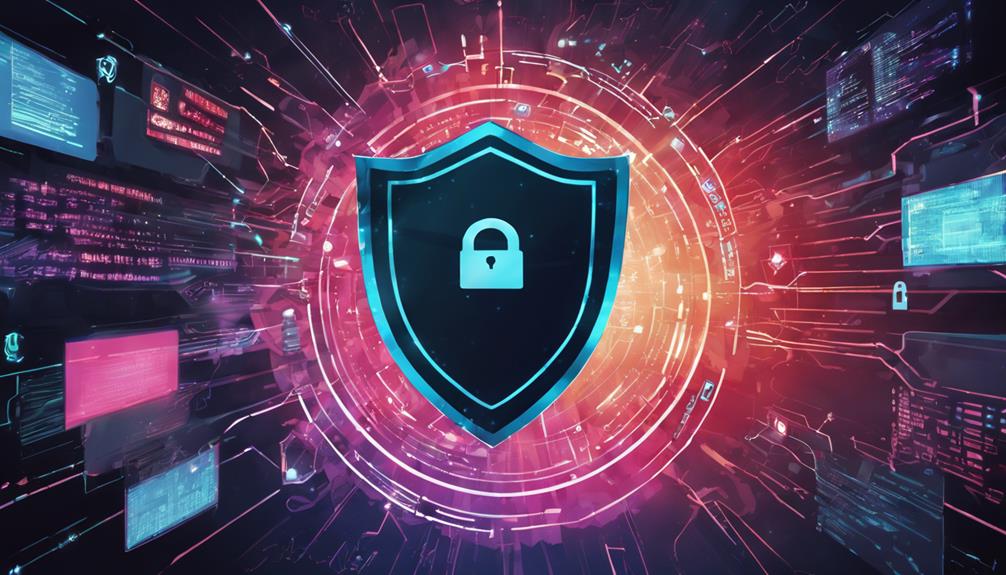Deciding between a Diploma in Cyber Security or Ethical Hacking post-10th grade involves understanding the core differences. Cyber security emphasizes protecting digital assets, while ethical hacking involves testing for weaknesses. The right choice depends on whether you prefer defensive or offensive security practices. Both offer promising career paths in the cybersecurity sector. Cyber security diplomas focus on prevention, while ethical hacking enhances offensive skills. Considering your interests and career goals is key. For further insights on each program and future prospects, exploring the nuances of each path is beneficial.
Key Takeaways
- Consider career goals and interests before choosing.
- Evaluate the curriculum alignment with desired skills.
- Research industry demand for cybersecurity and ethical hacking professionals.
- Assess financial implications and available scholarship opportunities.
- Seek advice from professionals in the field for guidance.
Cyber Security Vs Ethical Hacking
When comparing Cyber Security to Ethical Hacking, it is important to understand the distinct roles each discipline plays in the field of cybersecurity. Cyber security primarily focuses on safeguarding digital assets and systems from cyber threats by implementing various security measures.
On the other hand, ethical hacking involves testing systems for security vulnerabilities through offensive security strategies to identify and fix weaknesses before malicious hackers exploit them.
Individuals pursuing a diploma in cyber security will learn a broad spectrum of security measures to prevent cyber attacks and secure systems effectively. In contrast, those opting for a diploma in ethical hacking will focus on critical thinking abilities to simulate cyber attacks, enhancing their offensive security skills.
Understanding these differences is essential for individuals to choose the right diploma course based on their career prospects and job opportunities in the cybersecurity industry.
Career Opportunities in Cybersecurity

Delving into the vast landscape of cybersecurity careers reveals a multitude of lucrative and stable opportunities for professionals with specialized skills and expertise. The cybersecurity industry offers diverse career paths, including roles such as ethical hackers, security analysts, consultants, and more.
Individuals equipped with hands-on training in ethical hacking acquire practical skills that are highly valued in the industry. Cybersecurity programs not only focus on developing industry-standard skills but also prepare individuals for real-world scenarios, ensuring they are ready to tackle the challenges of the cybersecurity landscape.
Embarking on a career in cybersecurity opens doors to growth opportunities across various fields. Professionals in this industry have the chance to obtain valuable certifications that can significantly enhance their career prospects. With the increasing demand for cybersecurity experts, individuals with specialized skills can expect enhanced earning potential and job stability.
Diploma Program Structure Overview

Diploma programs in Cyber Security or Ethical Hacking offer a detailed breakdown of course modules, covering essential topics such as network security, ethical hacking techniques, and cyber threat intelligence.
Practical training holds significant importance in these programs, providing students with hands-on experience through labs and simulations to develop their cybersecurity skills effectively.
The structured curriculum of diploma courses is designed to equip individuals with the necessary knowledge and skills required for entry-level positions in the cybersecurity field.
Course Modules Breakdown
A breakdown of the course modules within a diploma program in cyber security or ethical hacking after completing 10th grade showcases a thorough curriculum focused on key areas of expertise.
The modules typically include:
- Network Security: Understanding the principles of securing networks, detecting and preventing unauthorized access, and implementing secure communication protocols.
- Cryptography: Learning about encryption techniques, cryptographic algorithms, key management, and secure data transmission methods to protect information confidentiality and integrity.
- Ethical Hacking Techniques: Exploring penetration testing methodologies, vulnerability assessment tools, and ethical hacking practices to identify and address security weaknesses proactively.
- Cyber Laws: Studying legal frameworks related to cybercrime, data protection, privacy regulations, and intellectual property rights to uphold compliance and ethical conduct in the digital domain.
These modules provide a solid foundation in essential areas like incident response, digital forensics, risk management, secure coding practices, and malware analysis, equipping students with the necessary skills to navigate the complex landscape of cyber security and ethical hacking.
Practical Training Importance
Enhancing cybersecurity skills in a diploma program involves emphasizing the critical importance of practical training through hands-on exercises and simulations. Diploma programs offer structured modules that focus on real-world scenarios to provide students with valuable hands-on experience in conducting ethical hacking exercises and security assessments. These practical sessions play an essential role in preparing students for cybersecurity challenges they may encounter in the field.
A key component of practical training in diploma programs is the emphasis on penetration testing, where students learn to identify and exploit vulnerabilities in systems ethically. By engaging in hands-on labs and simulations, students can gain a thorough understanding of cybersecurity concepts and develop the necessary skills to address security issues effectively.
This structured approach ensures that students are well-equipped to handle various cybersecurity scenarios and contribute meaningfully to the field upon completion of their diploma program.
Industry-Recognized Certifications

Industry-recognized certifications such as CEH, OSCP, and CISSP hold considerable weight in the cybersecurity field, signifying a high level of expertise in ethical hacking practices. These certifications not only validate one's skills but also act as a passport to lucrative job opportunities worldwide.
Embracing these certifications can substantially elevate career prospects and equip individuals with the necessary tools to excel in diverse cybersecurity roles.
Certifications Importance in Industry
The importance of industry-recognized certifications in the cybersecurity field cannot be overstated. These certifications, such as CEH, OSCP, and CISSP, are highly valued for their ability to demonstrate expertise in ethical hacking techniques and cybersecurity best practices.
Employers in the cybersecurity industry prefer candidates with these recognized certifications as they guarantee that the individual's skills and knowledge meet industry standards. Holding industry-recognized certifications not only validates proficiency but also opens up lucrative job opportunities globally.
These certifications play a vital role in showcasing the credibility of ethical hackers in the industry, providing a stamp of approval on their capabilities. In a competitive job market, having these certifications can greatly enhance a candidate's chances of securing desirable positions and advancing in their cybersecurity career.
Career Implications of Certifications
Having industry-recognized certifications such as CEH, OSCP, and CISSP can greatly impact an individual's career trajectory in the cybersecurity field. These certifications validate expertise in ethical hacking techniques and security practices, making professionals more attractive to employers seeking candidates for cybersecurity roles.
In today's digital landscape, where cybersecurity threats continue to evolve, the demand for certified professionals with these credentials is on the rise. Cybersecurity certifications like CEH, OSCP, and CISSP not only demonstrate proficiency in ethical hacking methods but also open doors to lucrative job opportunities globally.
Employers value the specialized knowledge and skills that come with holding industry-recognized certifications, as they indicate a commitment to staying updated with the latest cybersecurity trends and technologies. For cybersecurity professionals looking to advance their careers and secure high-paying positions, obtaining and maintaining industry-recognized certifications is a strategic investment that can lead to rewarding career prospects in the cybersecurity industry.
Hands-On Training Importance

Practical hands-on training in cyber security or ethical hacking post-10th grade equips individuals with essential skills for addressing real-world cyber threats effectively. Here are four key aspects that highlight the importance of hands-on training in this field:
- Enhanced Problem-Solving Abilities: Engaging in practical exercises and simulations during hands-on training fosters critical thinking skills. This hands-on experience allows individuals to tackle complex security issues with confidence and competence.
- Real-World Application: Through hands-on training, students gain experience in conducting penetration tests, security assessments, and using various hacking tools. This exposure to practical scenarios mimics real-world cyber threats, providing valuable insights into cybersecurity practices.
- Vulnerability Identification: Hands-on training enables students to identify vulnerabilities in systems and networks. By learning how to detect and address weaknesses, individuals can better protect against potential cyber attacks.
- Preparation for Diverse Cybersecurity Roles: The skills acquired through hands-on training prepare individuals for a wide range of cybersecurity roles, equipping them with the expertise needed to succeed in this dynamic field.
Choosing the Right Institution

When considering pursuing a diploma in Cyber Security or Ethical Hacking after completing 10th grade, selecting the appropriate institution is essential for a solid educational foundation. It is important to choose an institution that offers recognized certifications such as CEH, OSCP, or CISSP to establish a strong base in ethical hacking. Additionally, evaluating the institution's reputation, industry connections, and hands-on lab facilities is crucial for practical learning and skill development.
Furthermore, checking the alignment of the course curriculum with your career goals and the current industry demand for ethical hackers is essential. Look for institutions that provide flexible learning options, experienced instructors, and post-course support to ensure a thorough educational experience.
Researching scholarship opportunities, financial aid, and industry partnerships can also help in making an informed decision about the institution that best fits your needs and aspirations in the field of Cyber Security or Ethical Hacking.
Job Market Demand Analysis

The job market for cybersecurity and ethical hacking professionals is experiencing significant growth, reflecting a strong demand for skilled individuals in these fields. Here are some key insights into the cybersecurity job market:
- Projected Growth: The cybersecurity job market is booming, with a projected growth rate of 31% from 2019 to 2029. This indicates a sustained demand for cybersecurity professionals in the foreseeable future.
- Ethical Hacking Skills: Companies actively seek professionals with ethical hacking skills to protect their digital assets. Individuals proficient in ethical hacking can capitalize on numerous job opportunities across various industries.
- Average Salary: Ethical hackers can earn an average salary of $96,000 per year, making it a lucrative career choice for those with the right skill set and qualifications.
- Career Opportunities: Cybersecurity job roles are diverse, ranging from penetration testers to security analysts. Pursuing a diploma in cyber security or ethical hacking after 10th grade can open doors to a rewarding career with ample growth prospects.
Future Growth Potential

Amidst the dynamic landscape of cybersecurity, the future growth potential for individuals with expertise in ethical hacking remains promising and lucrative.
The cybersecurity market is on a trajectory to reach $352.25 billion by 2025, signifying significant opportunities for professionals with ethical hacking skills.
Job roles such as penetration testers are in high demand, offering competitive salaries for those adept in securing digital assets.
Pursuing a diploma in cyber security or ethical hacking after completing 10th grade can open doors to rewarding career opportunities in the field.
Acquiring industry-recognized certifications like Certified Ethical Hacker (CEH) can further boost job prospects and provide global recognition within the cybersecurity domain.
Continuous upskilling in ethical hacking is essential to staying ahead of evolving cyber threats, ensuring individuals are well-equipped to safeguard digital assets effectively.
Embracing this journey of lifelong learning and skill development can lead to a fulfilling and prosperous career in the ever-expanding domain of cybersecurity.
Financial Considerations & Scholarships

Securing financial assistance through scholarships is a practical approach for aspiring cybersecurity professionals looking to pursue ethical hacking training. When thinking about financial planning for cybersecurity courses, it's important to explore the available scholarships that can greatly reduce the financial burden.
Here are some key points to keep in mind:
- Diverse Sources: Scholarships for cybersecurity courses can be obtained from government entities, private organizations, academic institutions, and cybersecurity associations, offering a wide range of financial aid opportunities.
- Cost Range: The average cost of cybersecurity courses typically falls between ₹35,000 to ₹50,000. Understanding these costs is essential for effective financial planning before starting on ethical hacking training.
- Affordable Training: Reputable course providers offer quality training in cybersecurity at affordable rates, making it accessible for individuals interested in pursuing a career in ethical hacking.
- Reducing Financial Burden: Scholarships and financial aid options play a critical role in supporting individuals to pursue their passion for ethical hacking by alleviating the financial strain associated with course fees.
Frequently Asked Questions
Which Course Is Best After 10TH for Ethical Hacking?
For ethical hacking after 10th, consider a diploma in Ethical Hacking. It offers foundational knowledge, practical skills, and opportunities for certifications like CEH, enhancing career prospects. Selecting this course can pave the way for a successful cybersecurity career.
Which Subject Is Best for Cyber Security After 10th?
For a strong foundation in cybersecurity after 10th, subjects like Computer Science, Mathematics, and Physics are highly recommended. Understanding Information Technology, Networking, and Programming concepts is beneficial. Developing analytical and problem-solving skills is essential.
Is Diploma in Ethical Hacking Worth It?
A diploma in ethical hacking can be a valuable investment, providing practical skills in cybersecurity assessments and vulnerability testing. It opens doors to lucrative career paths in the cybersecurity industry, where demand for ethical hackers is on the rise.
Which Is Better, Ethical Hacking or Cyber Security?
When comparing whether ethical hacking or cyber security is better, it is crucial to understand the distinction between offensive and defensive security approaches. Ethical hacking focuses on identifying vulnerabilities, while cyber security involves implementing protective measures against cyber threats.
Conclusion
To sum up, making a choice between a diploma in cyber security or ethical hacking after 10th grade requires careful consideration of various factors. These include career opportunities, program structure, certifications, training, institution reputation, job market demand, growth potential, and financial factors.
According to a recent survey, the demand for cybersecurity professionals is expected to grow by 31% in the next decade, underscoring the importance of making an informed decision to secure a successful future in the field.









